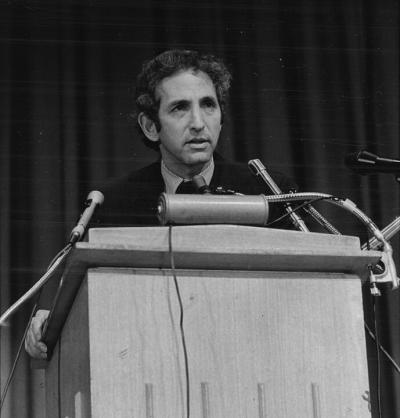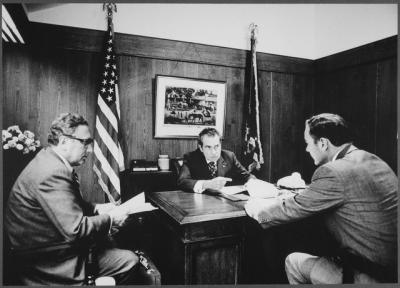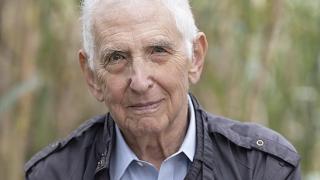
Daniel Ellsberg, speaking at a press conference, New York City, 1972
In an interview given to Politico and published less than two weeks before his death on June 16, Daniel Ellsberg demonstrated that neither the cancer which took his life, nor his five-decades-plus battle against a corrupted military-intelligence establishment, could dim his commitment to peace and justice, nor his passion for truth.
In the Politico interview, Ellsberg accused the U.S. government today of running a "covert empire" around the world, enforced by the U.S. domination of NATO. He said he believes that Washington deliberately provoked Vladimir Putin into invading Ukraine, by moving NATO eastward, rejecting the standard argument of defenders of NATO's war against Russia that Putin's special military operation was "unprovoked." To make the case that NATO expansion had been seen as a long-term threat by Russia, even before Putin's presidency, he cited George Kennan, the author of the containment policy of the Cold War, who in 1998 called NATO expansion a "tragic mistake", saying it would cause the Russians to "react quite adversely."
Ellsberg burst onto the public scene on June 13, 1971, when the "Pentagon Papers" first appeared in the New York Times. These were some 7,000 pages of reports compiled on the Vietnam war, which included both historical analysis by military and intelligence officers, and government documents. It was the result of an initiative taken by Defense Secretary Robert McNamara, who set up the Vietnam Study Task Force in 1967, to compile a record of the U.S. war effort. What jumped off the pages was the discrepancy between the optimistic reports made public by the proponents of the war, with the truthful admissions in the private, classified documents that the war could not be won. Ellsberg later said he could not allow the lies they were telling to go unchallenged. He said, for example, that Pentagon planners knew that Ho Chi Minh was a popular figure, and the brutality of the American war effort against the Vietnamese civilian population only increased his popularity.
The Pentagon Papers also included details about the significant loss of life—especially of civilians—and the destruction the war had unleashed, exposing secret operations which had been classified.
Ellsberg, a military veteran who was employed by the RAND Corporation, had initially been a supporter of the U.S. military engagement in Vietnam, but turned against it, and ultimately concluded he could no longer remain silent. After copying the documents compiled by McNamara's Task Force, he attempted to convince several Congressmen to read them on the floor of the Congress, but none would. So he went to the press, knowing it would expose him, which could lead to a lengthy prison sentence.
Fight For Truth and Against Censorship
The publication of the Papers had an immediate, explosive impact. The Nixon administration went ballistic, getting a court order to cease publication by the New York Times, while launching a slander campaign against Ellsberg—Kissinger accused him of being a "Kremlin agent"—and a "Plumbers" unit was deployed by the White House to break into his psychiatrist's office, in search of incriminating or compromising information. The initial court ruling of an injunction against the New York Times was based on the concept of "prior restraint", which Ellsberg denounced as "censorship in advance." Despite the frantic legal efforts to suppress the Pentagon Papers, taken against the New York Times, the Washington Post began publishing the stories after the ruling against the NYT. The New York Times eventually won a ruling from the Supreme Court, which allowed them to continue publishing the papers.

British agent Henry Kissinger (left) and President Richard Nixon discussing the Vietnam situation in Camp David, 1972 (with Alexander Haig, right).
The Supreme Court ruling in the NY Times Company versus the United States was a landmark decision. By a 6-3 vote, they rejected the use of "prior restraint" to suppress the documents. The ruling stated that "every moment's continuance of the injunctions against the newspapers amounts to a flagrant, indefensible and continuing violation of the First Amendment."
On June 23, ten days after the first New York Times publication of the secret documents appeared, Ellsberg was interviewed by CBS-News. Asked by America's most trusted news anchor, Walter Cronkite, what the documents showed, Ellsberg replied "that our officials never did concern themselves with the effect of our actions on the Vietnamese." (The same can be said of U.S./NATO war hawks today, who are refusing to negotiate an end to the Ukraine war, while pouring weapons and money into the battle against Russia, leading to growing casualties on both sides, despite admitting privately the war cannot be won.)
Ellsberg faced the prospect of a life behind bars, but was spared imprisonment when a mistrial was declared, based on "prosecutorial misconduct" committed by DOJ officials. Ellsberg said his one regret was that he had not acted sooner, to spare the lives of Vietnamese and Americans in the war.
He never dropped his campaign against government secrecy. In that same interview with Cronkite, he challenged the legitimacy of the secrecy in which the national security state operated. "I think we cannot let officials of the Executive Branch determine for us what...the public needs to know about how well and how they are discharging their functions." He spoke out against the national security policies of all presidents, and was especially tough in his comments against Bush for the lies leading to the Iraq war, and Obama for his attacks on whistleblowers. (While Obama bragged about how "transparent" his administration was, eight whistleblowers were prosecuted under the Espionage Act, more than the total number of prosecutions under all previous presidents.) Ellsberg praised and offered advice and support to Julian Assange, Chelsea Manning, Edward Snowden and other whistleblowers, and was an initiator in setting up the Freedom of the Press Foundation, to counter security state efforts to lie and censor.
His other major contribution was his damning critique of nuclear war planners, which he knew from the inside, as nuclear war planning had been his job at RAND. He wrote a book warning of the danger of nuclear war, "The Doomsday Machine: Confessions of a Nuclear War Planner", published in 2017. In the last days of his life, he continued to speak out about his concerns that the NATO war in Ukraine could lead to a nuclear war, which would wipe out the human race.
While he was uncomfortable speaking about his "legacy", his life provides a shining example of one who chose to do what was right, in spite of the consequences. His selfless courage should provide an inspiration today to those who recognize the danger from the permanent bureaucracy of the national security state, which threatens to bring us to a nuclear world war, and imperils our freedom to take actions to counter that threat.






